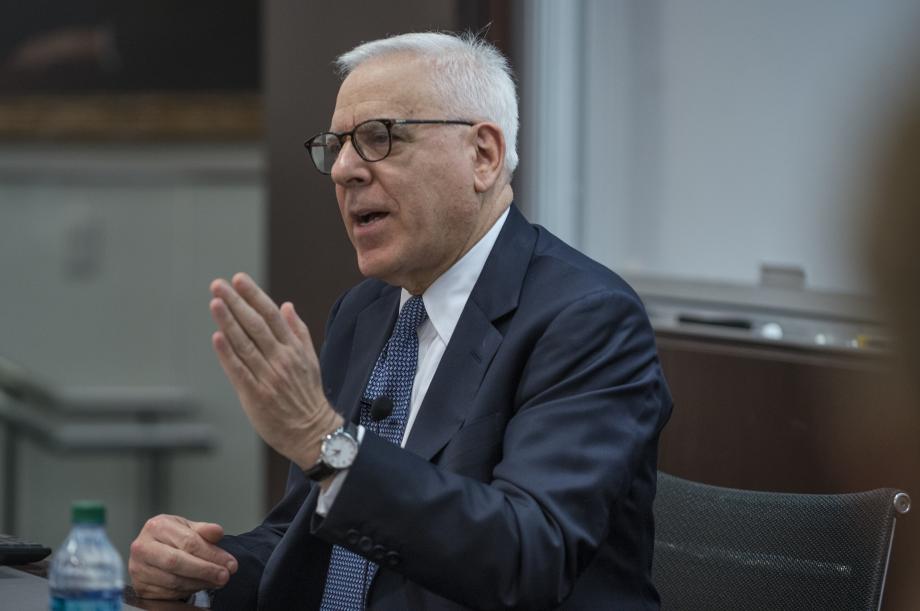David M. Rubenstein, ’73, on Lessons in Leadership and Philanthropy

Students who attended the lunchtime event with David M. Rubenstein, ’73, earlier this month were reminded that getting a JD from the Law School can lead to a career well outside of the legal field. Though Rubenstein practiced law after graduating, he is best known for co-founding the Carlyle Group, now one of the largest private equity firms in the world. His success, he said, gave him the opportunity to engage in meaningful philanthropy and better understand the characteristics that help shape influential leaders.
The Q&A was moderated by Dean Thomas J. Miles, the Clifton R. Musser Professor of Law and Economics, who began by asking Rubenstein why he chose the University of Chicago for law school. Rubenstein, who last year renewed his commitment to the Law School’s Rubenstein Scholars Program with a $13 million dollar gift, said the full-tuition scholarship he received from the University of Chicago had an enormous impact on his decision.
“My parents were blue-collar workers,” Rubenstein said. “My father worked in a post office and made $7,000 a year, so if I could get a full-tuition scholarship, I would accept that. I turned down all of the other law schools and decided to come here, even though I had never been to Chicago or visited the Law School.”
At the Law School, Rubenstein recalled that his fellow classmates were intimidatingly smart; both Senior Lecturer Frank Easterbrook, judge on the US Court of Appeals for the Seventh Circuit and Douglas Ginsburg, Senior United States Circuit judge on the US Court of Appeals for the DC Circuit, were in his class. He also remembered Richard Posner, then in his second year of teaching at the Law School, lecturing on the economic theory of torts.
“The faculty was an extraordinary faculty,” Rubenstein said. “We had some of the most famous professors in the legal world—when you’re reading a casebook that’s written by the professor teaching you, you realize you’re learning from the best.”
After graduating, Rubenstein practiced law at a firm in New York City and later was a deputy domestic policy adviser for President Jimmy Carter. When his time in the White House ended, he went back to practicing law, but didn’t find the work as exciting or enriching as he had hoped.
“When I went back to practicing law, I realized a couple of things,” he said. “If you don’t love what you’re doing, you can’t be great at it. Nobody ever won a Nobel Prize hating what they did, or did anything great in the world 9-5, five days a week. You have to love it with a passion.”
There were a number of factors that led Rubenstein to think about starting a private equity firm, including learning about the achievements of William E. Simon, a pioneer of the leveraged buyout, and coming across an article explaining that most entrepreneurs begin their first business between the ages of 28 and 37—Rubenstein was exactly 37 years old when he read the article.
“In my case, I took a chance,” he said of starting the Carlyle Group. “I wasn’t qualified to be in business or in government, but I took a chance, it worked out, and I was lucky. If you want to do something that makes the world a slightly better place, and make a real difference in the world, you’ve got to take a chance and do something out of the norm, and even do something your parents would tell you that you shouldn’t do.”
In addition to being comfortable with risk, Rubenstein told students that once they know their plan or idea is right, they have to be able to convince others that it is right as well.
“Nobody is a genius by him or herself,” he said. “You’ve got to convince other people—in fact, all of life is just convincing other people to do what you want, because you can’t do anything by yourself. You have to convince your partner, your spouse, your business associate, your law professor, whatever it may be, that you are right in what you’re saying. And if you learn the skills of convincing people and the skills of leadership, you can probably take a chance and do something useful.”
With the growing success of the Carlyle Group, Rubenstein felt a responsibility to share his wealth productively, and through his dedication to patriotic philanthropy, he has contributed to a valuable cause that lines up with his intellectual interests.
“In my case, I decided to focus on things where my money would get something started that wouldn’t otherwise get started, or complete something that wouldn’t otherwise get completed, and I will likely see the benefits in my actual lifetime,” Rubenstein said.
Among other documents, Rubenstein has purchased rare copies of the Declaration of Independence, the Emancipation Proclamation, and perhaps most famously, the only privately owned copy of the Magna Carta, which is now on display in the National Archives. He saw value in educating citizens about American history, and thus was committed to seeking out these documents and putting them on display for the public.
Toward the end of the talk, Rubenstein discussed being on the board of the Kennedy Center for the Performing Arts, the Smithsonian Institution, and the Library of Congress. He reminded students that the word “philanthropy” comes from the ancient Greek for loving humanity, and that they don’t necessarily have to give money in order to support these types of organizations.
“I want people to know that they should try to get involved, even if they don’t have money, to try to make the world a better place by giving their time, their energy, and their ideas,” he said. “You can give as much that way as you can by giving money.”